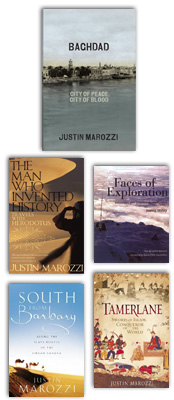Justin Marozzi’s latest book, published by Allen Lane in the UK and Pegasus in the US, is Islamic Empires: Fifteen Cities That Define a Civilization.
Islamic civilization was once the envy of the world. From a succession of glittering, cosmopolitan capitals, Islamic empires lorded it over the Middle East, North Africa, Central Asia and swathes of the Indian subcontinent, while Europe cowered feebly at the margins. For centuries the caliphate was both ascendant on the battlefield and triumphant in the battle of ideas, its cities unrivalled powerhouses of artistic grandeur, commercial power, spiritual sanctity and forward-looking thinking, in which nothing was off limits.
Islamic Empires is a history of this rich and diverse civilization told through its greatest cities over the fifteen centuries of Islam, from its earliest beginnings in Mecca in the seventh century to the astonishing rise of Doha in the twenty-first.
It dwells on the most remarkable dynasties ever to lead the Muslim world – the Abbasids of Baghdad, the Umayyads of Damascus and Cordoba, the Merinids of Fez, the Ottomans of Istanbul, the Mughals of India and the Safavids of Isfahan – and some of the most charismatic leaders in Muslim history, from Saladin in Cairo and mighty Tamerlane of Samarkand to the poet-prince Babur in his mountain kingdom of Kabul and the irrepressible Maktoum dynasty of Dubai. It focuses on these fifteen cities at some of the defining moments in Islamic history: from the Prophet Mohammed receiving his divine revelations in Mecca and the First Crusade of 1099 to the conquest of Constantinople in 1453 and the phenomenal creation of the merchant republic of Beirut in the nineteenth century.
REVIEWS
“An outstanding history of Islam. Excellent, authoritative and illuminating… Marozzi is an outstanding guide to the urban centres he expounds on, partly because of his deep understanding and love for the peoples and places he writes about. . . . The succession of delightful pen portraits of rulers, as well as writers, artists and scholars, makes for a riveting read. This is a fine book that helps recentre our understanding of the past by focusing on cities about which little is known in Europe, in spite of their enduring importance and the role they have played in history. It is a compelling and personal account by an author who knows, cares and has thought deeply about his subject matter. It is a new Hudud al-Alam, the famous 10th-century Persian geography book, for the 21st century – informing, revealing and delighting in some of the parts of the world that everyone should know about.”
[Tim Mackintosh-Smith, The Evening Standard]
“Superbly crafted… Marozzi has constructed a brilliant narrative by stringing together a necklace of tales from 15 extraordinary cities, some of which endure to this day as precious gemstones of civilisation, while others have imploded and exploded in the murderous fireworks of civil strife”.

